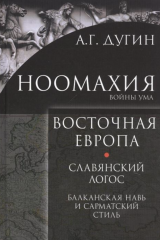Alexander Dugin, Noomakhia – Eastern Europe: The Slavic Logos – Balkan Nav and Sarmatian Style
(Moscow: Academic Project, 2018)
Noomakhia is the war in the sphere of the mind. The author of Noomakhia examines human history and the present as a ceaseless war between diverse civilizational projects founded on three noological paradigms (the Three Logoi of Apollo, Dionysus, and Cybele). The panorama of humanity presents in all its fullness and diversity the many dialogues, combinations, juxtapositions, appropriations, and annihilations of the Logoi which yield numerous types of rationality, mythologies, philosophies, religions, metaphysics, and constitute the plurality of civilizational constructs.
The space of Eastern Europe is a frontier between two civilizations – Western European and Russian. Precisely here ran the border between the nomadic, Indo-European, patriarchal civilizations of Turan and the matriarchal civilizations of Old Europe (which emerged in Anatolia and spread to the Balkans and Southern Europe), between the Catholic (Latin) Celto-Germanic West and the Russian-Orthodox East. The mosaic of this pivot region’s peoples and religions has never in history been geopolitically united, but this does not mean that the peoples of Eastern Europe cannot develop civilizational unity in the future and retrieve a cultural identity founded on the common Eastern European Dasein.
Since the fifth-sixth centuries A.D., the Slavic peoples have played a decisive role in the space of Eastern Europe. This volume of Noomakhia examines the Slavic horizon of Eastern Europe, which the author calls “Great Slaviania.” In question is not a concrete polity, but the inner unity of the Slavic Dasein, language, and ethno-sociological structure, constituted by the predominance of the settled agricultural population and the allogenic superstructure of a ruling warrior elite, the latter being an indirect trace of Sarmatian, Turanian, or Germanic influence. Alexander Dugin believes that, despite the powerful impact exerted on Slavic horizon of Eastern Europe by a number of non-Slavic peoples and powerful civilizational poles – such as Byzantium, Rome, Germany, France, England, Russia, and the Ottoman Empire – the mosaic of the West and South Slavic peoples, being the foci of mixed, self-sufficient cultures, can in the future form a multi-faceted and fully-fledged civilizational unity.“



